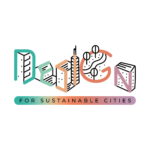2020 Design for Sustainable Cities
‘Design for Sustainable Cities’ is an international student competition, being held by BE OPEN and Cumulus. It is open to students and graduates of all art, design, architecture and media disciplines of universities and colleges worldwide. The competition aims to encourage creation of innovative solutions, by younger creatives, for more sustainable cities.

Your individual or team submission can win
- the Main prize of €5,000
- the Founder’s Choice prize of €3,000
- the Public Vote prize of €2,000
- the Safe City prize of €2,000
or enter the list of 50 honorary mentions and be featured in the competition’s online gallery.
The submission platform opens October 1st, 2020. The new extended deadline for submissions is January 31st, 2021.

The focus of the competition is the United Nations’ SDG11: Sustainable Cities and Communities. According to UN data, 2007 marked the shift to an urban world, with more than half of the world’s population now living in urban settings, cities and communities, and urban inhabitation is projected to rise to 60% by 2030. Cities and metropolitan areas are powerhouses of economic growth. However, this growth goes hand in hand with increased carbon emissions and escalating resource consumption.

Consequences of rapid urbanization are evident in growing number of slum dwellers, lack of decent and affordable housing, unplanned urban sprawl, inadequate and overburdened infrastructure and services ( such as water and sanitation systems, waste collection, communication systems, energy sources, road and transport infrastructure, food supply chains ), worsening air quality and access to clean water.

The UN Sustainable Development Goals are a direct response to the consequences of urbanization, with SDG11: Sustainable Cities and Communities putting particular focus on urban settlements. However, all 17 UN SDG’s are relevant when addressing urban sustainability.
To attain the UN SDGs we need to think out of box the goals. We need creative thinking – design thinking – and creative action. Design has a crucial role to play as an instrument or vehicle for the implementation of the UN SDGs. BE OPEN and Cumulus, and all of the stakeholders involved in this international competition programme, strongly believe that creativity is integral in the shift to sustainable existence.
The objective of ‘Design for Sustainable Cities’ is to recognize, showcase and promote the best design ideas and projects that embody and can advance the principles, aims and implementation of United Nations’ Sustainable Development Goals.

With ‘Design for Sustainable Cities’, we are specifically calling for submissions of design solutions for SDG 11* Sustainable Cities and Communities, focusing on one or more of the following three urban themes: Co-Created Cities; Sharing Cities; Safe and Sound Cities.
Note: while the focus of this competition is SDG11, no single SDG is the ultimate goal in terms of sustainability, nor is one goal more important than the other. Cities are part and parcel of all 17 SDGs. So, when addressing SDG11 you are also welcomed to think of the intersection with other SDGs.
The submission categories are:

1. Co-created Cities:
The city is humankind’s greatest collective work of creativity. As such the city is co-creation par excellence. We come together in cities to meet, greet, exchange and co-create. Cities are all important as fora for critical mass of critical thinking and tangible solutions. As our urban challenges increase, we need to do our utmost to enhance and innovate how we interact, both in the physical and virtual world. We can go further in creating sustainable cities if we do so collectively. Collective action can better offer and accelerate value. Co-creation is the path to collective impact.
Key words: co-created, co-design, value co-creation, collective impact, interactive, bridged services and facilities, user-centred design, service design
SDGs: SDG11 + SDG13 Climate Action, SDG17 Partnership
Note: In striving for SDG11 Sustainable Cities, it is said both by some world leaders and urban leaders that SDG13 for Climate Action is the most urgent, but to achieve any of the goals SDG17 Partnership is the most important, and certainly the most relevant when co-creating cities.
2. Sharing Cities:
The city is based on co-existence, shared resources, on shared space, shared thinking, shared respect. The sharing city goes beyond pure consumption. The sharing city is a city and society seeking to optimize resources, making the most of recycling, repurposing, retrofit, reuse of resources. The sharing city is regenerative.
The sharing city is inclusive, striving to make room for everybody, striving for urban ecologies, striving for healthy balances between humankind, built environments and natural environments. The sharing city is the caring city. The sharing city is also about sharing the intangible, sharing cultures, sharing insight and knowhow, sharing responsibilities, sharing blood, sweat and tears, sharing celebrations, sharing experiences happy, sad and sublime, sharing creative forces. This includes sharing designs. This is embracing open source. We are better when we do things together.
Key words: resources, recycling, repurposing, retrofit, reuse, lifecycle, circularity, optimization, increase of the utilization
SDGs: SDG11 + SDG12 Responsible Consumption
3. Safe and Sound Cities:
Safety, security, health and well-being are at the crux of urban co-existence. The greatest individual concern is health and well-being. The greatest collective urban concern is public health and welfare. First and foremost, access to clean air and provision fresh water ( ref. access to fresh water is the Achilles heel of any and every city and settlement ). There next food and shelter are vital for a sound city. Any infringement on our health and security directly impacts our levels of happiness and well-being.
Our sense of security is certainly being put to the test with current COVID-19 worldwide health crisis. Some are turning their backs on cities, seeing cities as problematic places to be. But urban density is not necessarily to blame for the pandemic. We confuse social distancing with physical distancing. We need to be creative about how to be together apart, how to sustain and foster social interaction while maintaining safe distance. We need to adapt and adopt pre-cautionary practices so that we can safely co-exist in meaningful ways.
Solutions for safe and sound cities are more important than ever! To highlight this urgency, this competition includes the Safe City Prize.
Key words: safety, security, health, well-being, happiness, trust, social distancing, physical distancing, nudging
SDGs: SDG11 + SDG2 Zero Hunger, SDG3 Good Health, SDG6 Clean Water
Who can submit?
The competition is open to students of art, design, architecture and media disciplines of universities and colleges worldwide, who are pursuing either a Bachelor level or Master level program. Students that are currently enrolled in higher education institutions or students who have graduated in 2020 and/or are graduating in 2020 are eligible to participate.
There is no limitation in the number of submissions per institution, and there is no cost to submit.
Entries must be comprised of work that is original; individuals and/or teams must hold the Intellectual Property for their submissions and have the right to enter and publish the submitted work.
You can submit your entry starting October 1, 2020.
Timeline:
The submission platform opens October 1st, 2020.
The new extended deadline for submissions is January 31st, 2021.
The winners and honorary mentions announced by April 1, 2021.
The winners celebrated at Cumulus Roma in June 2021.
General inquiries: info@citydesign2020.com
Communications & Press office: press@beopenfuture.com



